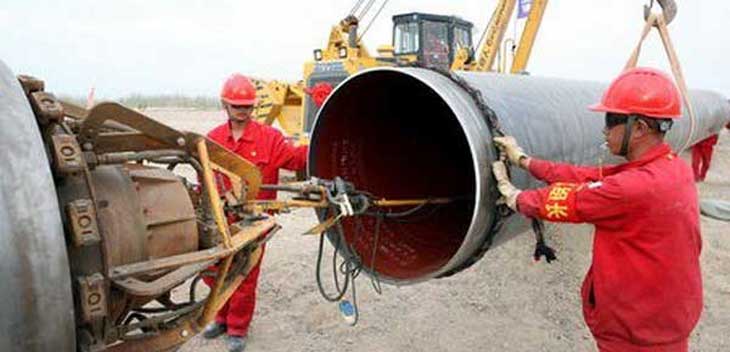 |
World's longest natural gas Pipeline |
World's longest natural gas pipeline begins operation in China
An 8700 kilometer natural gas pipeline linking Turkmenistan to 15 provinces in China, the world's longest natural gas pipeline, commenced operation on June 30, 2011 according to media reports.
The second West-East natural gas pipeline (WEPP) project was constructed at a total cost of 142.2 billion Chinese yuan (US $21.99 billion).
The WEPP Line 2 has one trunk line and eight sub-lines. It will transport 30 billion cubic meters of natural gas every year from reserves in Xinjiang to 15 provinces and regions across China, from Shanghai in eastern China to Guangzhou and Hong Kong in the south. The pipeline is expected to secure gas supplies for China for more than 30 years.
 The new gas pipe lines are expected to provide cleaner power for 270 Chinese cities
The new gas pipe lines are expected to provide cleaner power for 270 Chinese cities
Experts said the project's implementation marked an important milestone in China's quest for tapping Central Asia's vast energy resource(s).
Liao Yongyuan, the vice president of China National Petroleum Corporation (CNPC), noted that the project would help boost natural gas supplies to China's booming industrial zones, as well as stimulate social and economic development in regions through which the pipelines pass.
Once the various sub-lines begin operation in 2012, the project will benefit up to 500 million people, predicted Liao.
Xu Yongfa, the president of CNPC's Petroleum Economics and Technology Research Center, said the new pipeline will not only help balance the demand and supply of natural gas in the Pearl River Delta and the Yangtze River Delta regions, as well as the central and southern parts of China, but also complete a gas pipeline network consisting of the WEPP Line 1 and other branches. The entire pipeline network will stretch across nearly 40,000 kilometers on the mainland.
After all the sub-lines become operational in China, 270 cities will gain access to natural gas in 2011. In addition, a pipeline network covering 31 provinces, giving 95 percent of China's cities access to natural gas, will be completed by the middle of the 21st century.
Zhou Dadi, the vice president of the China Energy Research Society, said that China's natural gas consumption is lower than the average Asian level. Given the current rapid growth in natural gas demand, the WEPP Line 2's completion would help optimize China's energy consumption. Moreover, the new pipeline is important for the sustainable development of the environment and natural resource(s).
Currently, natural gas accounts for only 4 percent of China's energy consumption, about one-sixth of the global average and one-twelfth of the level of developed countries in Europe and the United States.
Furthermore, the world consumes 508 cubic meters of natural gas per capita per year, equivalent to more than eight times China's annual consumption per capita.
The countrywide distribution of gas is expected to boost China's clean energy consumption.
Experts estimated that the gas transported from Central Asia could be used to replace 76.8 million tonnes of coal, as well as reduce an expected 130 million tonnes of carbon dioxide emissions, along with 2.46 million tonnes of other harmful emissions.
Reference(s) .. China National Petroleum Corporation (CNPC)